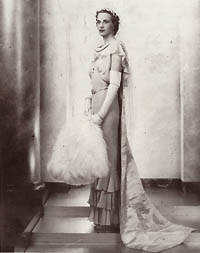(3-30) We are a family of zealots. We believe in causes. Our causes have been many, from saving souls to finding lost cities to issuing visas to refugees.
(3-31) In 1820, the first Hiram Bingham led the first group of missionaries to Hawaii. When their ship was beset by howling winds, he exhorted the others not to give in to fear and despair. Once in the islands, he was a stickler for propriety, wearing black wool even in 90-degree heat. He approved of his converts imitating his attire since it "greatly diminished their practice of swimming and sporting in the surf." His son, Hiram Bingham II, was also a missionary.
Rose Lawton
Morrison was the daughter of a senator and, like the man
she married, the child of privilege. For decades, this
photograph of her, made when she was presented at Court
in England in 1933, stood on the mantle of the Binghams'
home in Salem.
(3-32) He went even farther afield, to the Gilbert Islands in the
far reaches of the South Pacific. He was also a firm believer in
the sanctity of the Sabbath and of the power of the rod to curb
any base instincts in his only child. As had his father before
him, Hiram Bingham II felt a dreadful responsibility not to damage
his immortal soul with wrong behavior.

(3-33) Despite a strict and somewhat narrow upbringing, his son, Hiram III, was led to explore the world rather than to save souls. In 1911, he uncovered the lost ruins of Macchu Picchu in Peru. He also became a senator, married a Tiffany heiress and raised seven sons to fulfill the responsibility of their heritage. They might have money, provided by his wife's fortune (her grandfather Charles established the fabled jewelry store) but his sons would not be spoiled.
(3-34) According to one of my uncles, Hiram III was a strict disciplinarian; his word was law and required absolute obedience. Willfulness and rebellion were met with swiftly administered corporal punishment.
(3-35) Hiram "Harry" Bingham IV, the second of seven sons, was born during the summer of 1903. During his growing-up years, his father was absent for months at a time on his many explorations of South America. His father's absences made obedience to following the rules even more of an imperative. Harry and the others were anxious for their father's approval. Rather than discouraging sibling rivalry, their father often pitted the brothers against each other.
(3-36) Hiram rewarded good grades with money. Wood, the eldest, often got paid more than Harry because his grades were better. On the other hand, Harry excelled at athletics and could beat any of the other Bingham boys at Tennis. He usually won most of the events in the family Olympics.
(3-37) Though Hiram was not a strict theologian as his father had been, he instructed the boys' governess to include daily Bible readings in their morning studies. Above all else, Hiram III was anxious for his boys to "accomplish something worth doing." He instilled in his seven sons the sacred purpose of striving for something above and beyond the ordinary.
(3-38) Both Harry's parents gave him a sense of entitlement. My own father, Mitchell, Harry's younger brother, recalls their mother saying, "Culturally, you are better than anybody else. The Bingham brothers are superior." Yet Alfreda, despite her enormous wealth, was a woman of simple tastes. She preferred playing the violin to dancing at a ball and family meals of boiled chicken and stewed fruit to state dinners.
(3-39) Like many of his brothers, Harry was an odd combination of worldly and unworldly. But he favored his father's taste for fancy cars, elegant clothes, French food, and the glitter of politics. His education was the traditional path for moneyed boys in the East. He went to both Groton - where he was known for being so conscientious about doing the right thing that some teasingly referred to him as "Righteous Bingham" - and Yale. At these protected, elitist institutions, men were taught that they were the next leaders of the world, and that their actions and thoughts put them, in some sense, beyond reproach and above the rules. Moreover, it was a world of secret societies, of inner and outer circles of power, important to remember in understanding Harry's later coming to believe in secret societies that ran the world.
(3-40) During the years his father was in the Senate, Harry was taken to Washington, shown the sights and introduced to presidents. A career in the Foreign Service seemed to combine many of the values he cherished. He could travel the world, do good works, yet also mingle with the wealthy and knighted.
(3-42) As a child, I had heard of Uncle Harry's glamorous years in the Foreign Service, but when occasionally something was mentioned about his position in Marseilles, my Aunt Rose's face would cloud over and she would put an end to any discussion by saying rather forcefully, "Your Uncle Harry never did anything illegal."
(3-43) When I began to want to understand, I had to go to books on the subject. Varian Fry's "Surrender on Demand," and "Crossroads Marseilles, 1940," by Mary Jayne Gold, helped a lot. My cousin Bill, who has devoted years of research to the subject of his father, was of inestimable value. He directed me toward Hannah Arendt and Saul Bellow and the book, "The Secret War Against the Jews." Bill stood by me as I sifted through all the yellowing letters and files and photos he had found in that box behind the chimney. I began to clip newspaper articles and read Bill's own account, entered into the Congressional Record of February 1998. My cousins John and Abby generously offered their thoughts and memories. The following is culled from all those sources.